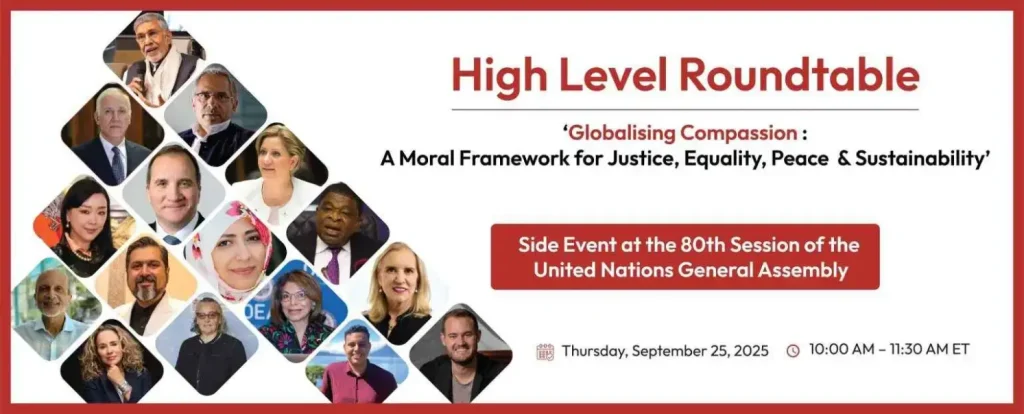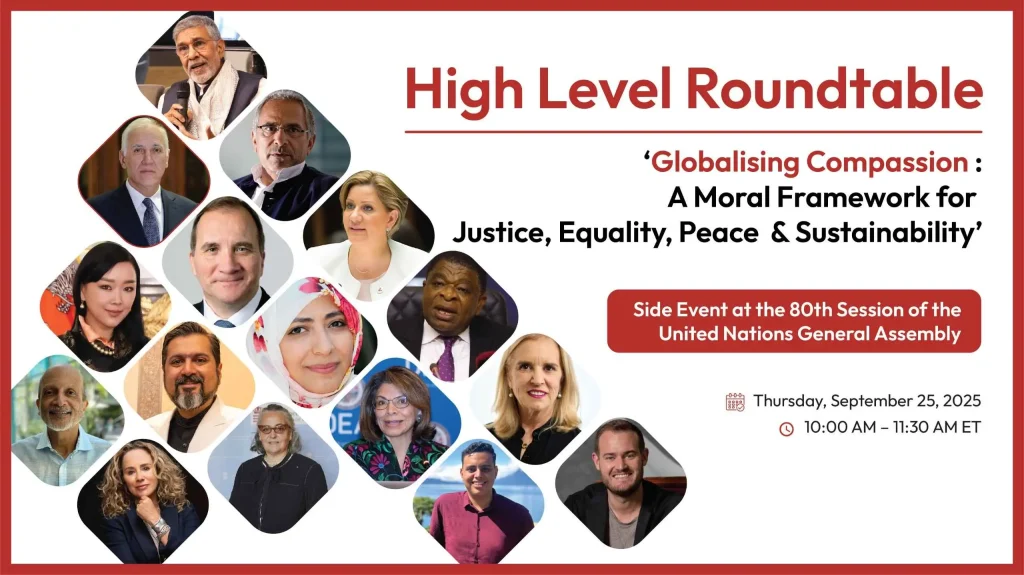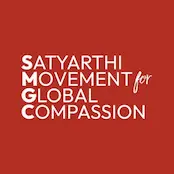Menu
Main Menu


The upcoming 80th Session of the United Nations General Assembly, with its theme “Better Together: 80 Years and More for Peace, Development and Human Rights,” arrives at a defining moment in history. It calls upon the international community to renew its commitment to multilateralism, solidarity, and collective action for the well-being of people and the planet. In alignment with this call, the High-Level Roundtable seeks to advance a framework anchored in compassion—an indispensable force for driving systemic transformation in leadership, governance, and intergenerational progress at every level to accelerate efforts in attaining SDG Goals.
The High-Level Roundtable will convene Nobel Peace Laureates, global thought leaders, youth advocates, and institutional stakeholders to chart a moral agenda for our times, focused on four foundational pillars: Justice, Equality, Peace, and Sustainability. Inspired by the vision of Nobel Laureate Kailash Satyarthi, the dialogue will move beyond rhetoric to catalyse bold, compassionate action rooted in urgency, shared responsibility, and global solidarity.
This 90-minute High-Level Roundtable will commence with a keynote address by Nobel Peace Laureate Mr. Kailash Satyarthi, followed by interventions from esteemed global leaders, including H.E. José Ramos-Horta (President, Timor-Leste and Nobel Peace Laureate 1996), H.E Vahagn Khachaturyan (President, Armenia), Mr. Martin Chungong (Secretary General, Inter-Parliamentary Union), Tawakkol Karman (Nobel Peace Laureate 2011) and Ms. Kerry Kennedy (President, Robert F. Kennedy Centre for Human Rights) among others from different walks of life.
A curated roundtable dialogue will then explore four thematic pillars through anchored provocations and concise participant reflections. The session will close with a message from a youth leader, culminating in a collective call to action.
Our world needs leaders who combine moral courage with a global vision. Compassionate leadership acts across borders, reimagines cooperation, and rejects fear-driven models of power in favour of conscience and shared humanity. It puts the well-being of people and the planet at the centre of decision-making.
Democracy thrives when every voice counts—especially those of the marginalised. In the face of polarisation and majoritarian dominance, compassion calls for institutions that protect pluralism, defend dissent, and ensure equitable participation in decision-making. This means safeguarding minority rights, promoting civic dialogue, and embedding compassion into lawmaking and policy—strengthening peaceful, just, and inclusive societies.
Governance is more than administration—it is the architecture of trust and justice. Compassionate governance dismantles inequities, ensures transparency and integrity, and designs institutions that respond to the needs of all, with a special responsibility to those furthest from power. By embedding justice at the core of policy and resource allocation, it ensures that fruits of governance and justice reach the last child in our world.
Young people are not only demanding change—they are creating it. Compassionate youth leadership channels integrity, innovation, and clarity into action. It builds intergenerational solidarity, sharing power and responsibility across age groups to shape the present and future of human kind.
The High-Level Roundtable will present a strong case for a compassion driven approach in global and local governance for a just, equitable, peaceful and sustainable world.
The dialogue will help build a collective moral voice of Compassionate Leaders across organisations and institutions, worldwide. With a sense of urgency, this united voice will call for bold measures to bring the SDGs back on track—recognising that many targets are failing—and for decisive action to realise the 2030 Agenda for Sustainable Development.
Participants will commit to the continuity of dialogue and the pursuit of a common vision for advancing Compassionate Action. This will include agreement on possible agenda of action for creating a compassionate world.
The discussions will serve as a basic framework to be formally launched at the proposed “Laureates and Leaders Summit” in April 2026, as a collective call for a compassionate world.

Kailash Satyarthi, Nobel Peace Laureate 2014 and Founder, Satyarthi Movement for Global Compassion

H.E. José Ramos-Horta, President of Timor-Leste and Nobel Peace Laureate 1996

H.E. Vahagn Khachaturyan, President, Republic of Armenia

H.E. Laura Chinchilla, Former President of Costa Rica

Tawakkol Karman, Nobel Peace Laureate 2011

HRH Princess Sonam Dechan Wangchuck, President, Jigme Singye Wangchuck School of Law, Bhutan

Martin Chungong, Secretary General, Inter-Parliamentary Union (IPU)

Kerry Kennedy, President of Robert F. Kennedy Center for Human Rights

Gabriela Ramos, Assistant Director-General, Social and Human Sciences, UNESCO

H.E. Isabelle Picco, Ambassador and Permanent Representative, Permanent Mission of Monaco to the United Nations

Ricky Kej, 3X Grammy® Award Winner and UN Goodwill Ambassador

Brian Kelly, Founder, The Points Guy

Lisa Kristine, Award-Winning Humanitarian Photographer and Founder, Human Thread Foundation

M.R. Rangaswami, Founder at Indiaspora and Board Member, Kailash Satyarthi Children’s Foundation, US

We are facing a crisis of morality. We have created systems and structures that favour power and profit, and not people and planet. The gap between the decision makers and those who are most affected is ever widening. The choice in front of us is very simple, either we sit still and watch the world burn or we do something about it.

There is something more devastating than a gun or knife. It is telling a child to go to school with no books. It is telling a man with a job that doesn’t pay a living wage to pay his rent. It is telling someone who is sick that they cannot get healthcare. And this is what compassion is all about. Compassion is not passive, it is active.

We are fighting systemic forces that lack compassion. Growth cannot be measured by GDP alone. We need to push for compassionate action in policy, technology, and economics—putting people, rights, and sustainability first. Ethical AI and compassionate leadership must protect freedom and equality.

Perhaps, two generations from now, a grandson of a refugee child or a granddaughter of a farmer, will stand here on this stage, not speaking about inherited pain but about conquered hope – that is the power of compassion and that is the task of our generation.

Bhutan chose a path that prioritizes well-being and sustainability and aspires to show the world that compassion in leadership is not a distant idea but a living practice. Such compassionate leadership must extend far beyond a few nations.

The biggest threat we face is the belief that someone else will make the difference—governments, corporations, leaders. But real, lasting change begins with us. It starts when we choose compassion and change our own behavior.

Compassion is not just a soft notion. It is a bold and powerful force- one that can reshape leadership, governance, and systemic change. Through compassion, we can embed justice, equality, peace, and sustainability into the very heart of decision-making.

Compassion is a catalyst for systemic transformation in leadership, governance, and intergenerational progress. In a world facing moral crises, compassionate leadership can inspire collaboration, innovative solutions, and policies that protect the most vulnerable while advancing the SDGs.

Compassion is not a reaction to crisis, it is a way of life. Every act of care, every choice of courage, transforms our world. Let us globalise compassion—for peace, equality, and hope for all humanity.

Compassion means being strong. It means being the voice of people who suffer— from injustice, tyranny, poverty, corruption, and climate change. To be compassionate is to help people. That is the real power.

Compassion is needed now more than ever, especially in the corporate world. True leadership is not about profits alone — it’s about accountability, partnerships, and investing in people. Compassionate leadership is the most powerful business strategy of all.

We must distinguish between just sympathy, where you feel sorry for others, and empathy, where you put yourself in their shoes. Compassion goes further — it means taking action, like helping the unhoused person you might otherwise walk past.

ABOUT US
Satyarthi Movement for Global Compassion enhances compassion in individuals, institutions and societies, to achieve justice, equality, peace and sustainability for all.
CONNECT WITH US
SUBSCRIBE FOR UPDATES
©2024 SMGC. All rights reserved.
Terms and Conditions: